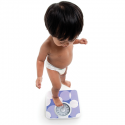Know the signs: Asthma attack symptoms and asthma triggers

Help prevent asthma attacks for yourself and loved ones
Asthma is a chronic lung disease where inflammation in the airways makes it hard to breathe.
With asthma, you may find it harder to breathe if you are exposed to a trigger (like dust, chemicals, or pollen). Asthma triggers can cause swelling in your lungs, which can cause you to have asthma symptoms. When this happens, it is called a flare-up or an asthma attack.
Asthma attack symptoms
Asthma attack symptoms can vary from person to person. They can be mild to severe, lasting for a few minutes, hours, or days. They may develop when you are exposed to your triggers or you may experience them every day.
These symptoms can include:
- Coughing, especially at night.
- Chest tightness.
- Shortness of breath.
- Difficulty breathing.
If your symptoms become more intense or more symptoms occur, you may be having an asthma attack. If you are having an attack, you need emergency care.
Early warning signs that could lead to an asthma attack
Early warning signs are changes that happen at the beginning of an asthma attack. They are the earliest signs that your asthma symptoms are worsening. They may include:
- Frequent coughing, especially at night.
- Losing your breath easily or having shortness of breath.
- Feeling tired or weak during exercise.
- Wheezing or coughing after exercise.
- Feeling tired or irritable.
- Having a decrease or changes in your lung function as measured on your peak flow meter.
- Showing signs of a cold or allergies (sneezing, runny nose, coughing, congestion, headache, or sore throat).
- Having trouble sleeping.
- Needing to use your rescue inhaler more often.
These symptoms may not be severe enough to stop you from daily activities. But it’s important to treat these symptoms when you first notice them. You may be able to prevent them from getting worse and possibly causing an asthma attack.
If you are having any of these symptoms, follow your asthma action plan and take your medicines as prescribed.
Learn more about how to manage your asthma medication.
When should you seek emergency treatment?
- You don’t feel better after using your rescue inhaler.
- You can’t say more than a few words at a time.
- Your lips or fingers are turning blue or gray.
If you have an emergency, go to the nearest emergency room, call 911, or call the local ambulance service.
What can cause an asthma attack?
There are many triggers for asthma attacks. It is important to know your triggers. Avoiding your triggers can help prevent asthma attacks. Here are some of the most common causes:
Allergies including dust mites, cockroaches, pollen, mold, pet dander, and rodents
Ways to avoid
- Clean your home regularly.
- Don’t let your pet sleep in bed with you.
- Talk to your doctor about taking allergy medication.
- Use a weather app to check allergy levels in your area.
Air pollution including cigarette smoke, wood fires, charcoal grills, strong fumes or odors, and chemicals
Ways to avoid
- Keep your windows closed.
- Stay indoors.
- Avoid products like perfume, paint, and hair spray.
- Use a weather app to check your air quality.
Other health concerns including obstructive sleep apnea, food allergies, acid reflux, anxiety, obesity, and lung infection
Ways to avoid
- Make an appointment with your doctor for your yearly wellness check-up.
- Your doctor can identify any other health conditions you have and help you manage them.



